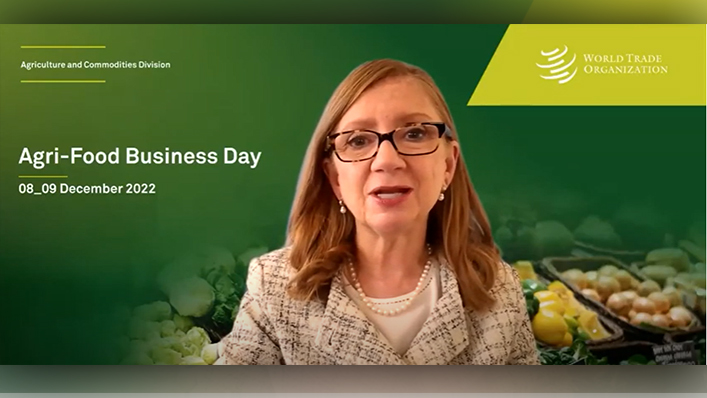
In her opening remarks, DDG González highlighted the seriousness of the food crisis that the world is facing due to an array of factors, the COVID-19 pandemic, the war in the Black Sea region, high inflation and a potential economic recession, and the effects of climate change.
Citing the latest figures of the UN Food and Agriculture Organization, she noted that food prices, despite dropping from their peak in March this year, still remain 2 per cent higher than last year. Notably, the global food import bill is forecast to surge to an all-time high in 2022, exceeding USD 2 trillion, and the global agricultural input import bill (mainly fertilizer) is forecast to reach around USD 424 billion in 2022, a leap of 50 per cent compared to 2021.
DDG González said that in the face of pressing challenges, trade has a crucial role to play in ensuring global food security, since “trade feeds one in every six people around the world”. She drew attention to WTO members’ quick action in response to the food crisis, highlighting their success in reaching three outcomes at the 12th Ministerial Conference (MC12) in June this year which have food security at their core. These include a declaration on the emergency response to food insecurity, a decision to support World Food Programme food purchases, and a sanitary and phytosanitary (SPS) declaration to modernize the SPS Agreement, which regulates food, animal and plant standards.
She warned of the worrying trend of export restrictions since the outbreak of the war in Ukraine, noting that 33 members and observers had introduced 72 export-restrictive measures on food and feed and six on fertilizers, of which only 20 have since been phased out. She urged governments to implement the MC12 outcomes, refrain from export restrictions and promote free trade at a time of crisis. “No one country can go it alone, whether on food, vaccines and pharmaceuticals, or any other product,” she emphasized.
DDG González asked participants not to forget that the WTO has come a long way in liberalizing agricultural trade and has made an enormous difference to global food security by putting in place binding rules that have brought down trade barriers and significantly levelled the global playing field.
She indicatecd that global trade in agricultural products has more than tripled since the Agreement on Agriculture entered into force in 1996 and is now worth over USD 1.8 trillion. She added that South-South agricultural trade has also thrived and now accounts for one quarter of total agricultural trade flows.
There were positive signs even during the crisis, she said, referring to the WTO Trade Monitoring Database, which indicates that 61 members and observers have rolled out 55 trade facilitative measures on food and feed, and eight on fertilizers. These signs show that “many WTO members have realized that it is in their interest to unilaterally open their markets further on food, feed and fertilizer, so as to lower food price inflation domestically,” she said.
Looking ahead, DDG González highlighted that more needs to be done at the WTO to bolster global food security. She underlined the importance of continuing the agricultural trade reform process, closing the gap between applied and bound agricultural subsidies and tariff rates, and continuing to address non-tariff barriers to agricultural trade. “The reform process must continue to go forward. The world cannot afford to have the WTO fail,” she said.
DDG González also drew attention to a newly-established work programme aimed at helping address the food security concerns of least-developed countries (LDCs) and net food-importing countries (NFIDCs) in line with the MC12 mandate. The working group established under the programme will discuss themes of particular interest to LDCs and NFIDCs in the coming year, with the aim of making a set of recommendations for the Committee on Agriculture to consider no later than the end of November 2023.
She expressed the hope that members can maintain high ambitions in the forthcoming discussions “because this is a topic that is critically important for many of these countries and for the world at large,” she added.
The opening session was followed by five roundtables that delved into specific topics, including: resilient global food and agricultural value chains; food standards for better functioning global value chains; trade facilitation, digitalization and e-commerce; the environmental sustainability of global value chains; and industry views on the rules-based multilateral trading system.
The full programme is available here.
The video recording is available here.
Share
Reach us to explore global export and import deals